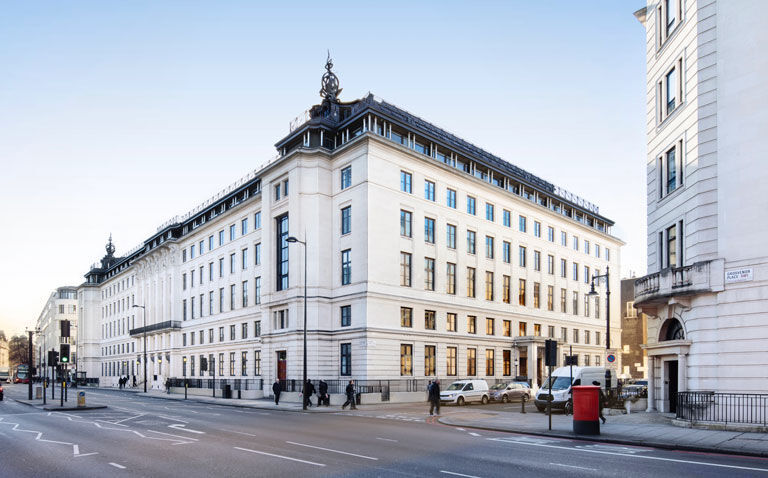
It’s been almost a year since the Cleveland Clinic London opened its doors at 33 Grosvenor Place, London.
The 184-bed private hospital, owned by the Cleveland Clinic, a US non-profit multispecialty academic medical centre founded in 1921, provides a suite of cardiology services for both common and complex heart conditions.
Among those is a comprehensive transcatheter aortic valve implantation (TAVI) programme, which treats aortic stenosis through a tiny groin incision, and minimal access endoscopic mitral valve surgery.

Professor Olaf Wendler, a consultant cardiac surgeon with more than 30 years’ experience and chair of the Heart, Vascular and Thoracic Institute at Cleveland Clinic London, shares the inspiration for his chosen career path and shines a light on the pioneering work being undertaken at the facility.
Where did you study?
I did my surgical training at the Medical School Hannover and the Heart Center Leipzig in Germany and then became clinical lead at the University Saarland, Germany. I was the director of cardiovascular services at King’s College London from 2006 to 2012 when I was promoted to professor of cardiac surgery at King’s College London. In 2019, I was appointed chair of the Heart, Vascular and Thoracic Institute at Cleveland Clinic London.
Why were you drawn to cardiac surgery?
I was particularly attracted by how easily patients can recover from major cardiac surgery if they get the right surgeon. Throughout my career, I have been heavily involved with developing new techniques and devices that reduce the trauma of surgery for patients. The focus of my surgical and academic works is in the field of heart valve surgery. Together with my cardiology colleagues, we have developed techniques to repair and preserve native heart valves, as well as minimally invasive and keyhole therapies to replace heart valves. In 2007, the teams and I performed the UK’s first transapical TAVI procedure, followed by numerous innovative therapies. My expertise also lies in complex and repeat combined heart procedures, complete arterial coronary bypass surgery and complex thoracic aortic surgery.
Cleveland Clinic London launched last year. Can you tell us more about its model?
Cleveland Clinic London employs around 1,150 caregivers, including over 450 nurses. Almost 300 doctors work with us, with the majority doing all private work exclusively here and maintaining their NHS practices. The hospital is the newest location in Cleveland Clinic’s expanding global footprint and the second in London, following the opening of Cleveland Clinic Portland Place Outpatient Centre in September 2021. The Cleveland Clinic health system, which employs more than 77,000 caregivers worldwide, has pioneered many medical breakthroughs including coronary artery bypass surgery, the first face transplant in the United States and, most recently, the first uterus transplant in the United States.
What innovative treatments does the hospital provide?
We have implemented the most comprehensive transcatheter heart valve programme in a London private hospital. Between June 2022 and February 2023, we performed 64 TAVI procedures under the leadership of Professor Bernard Prendergast and Professor Simon Redwood. Most of our aortic valve and mitral valve surgery is performed through minimally invasive procedures to allow the faster recovery of patients. We also preserve native heart valves and repair them whenever possible – not only the mitral valve but also the aortic valve.
Treatment for narrowed and leaking heart valves in the most challenging patients is also a focus. Consultant cardiologist Professor Baumbach performed the first valve implantation into a leaking aortic valve in a London private hospital. The above service is supported through world-class cardiovascular imaging services with imagers part of the multidisciplinary teams.
Our surgical and interventional outcomes have been excellent with no in-hospital mortalities after cardiac surgery and intervention since opening. We also have regular M&M meetings to detect not only mortality but also morbidity after surgery and intervention.
Our thoracic surgeons have successfully started to perform robotic thoracic surgery to reduce the side effects in patients. It enables them to perform operations on the lung through keyholes, which shortens the recovery times of patients.
Are you looking to invest in any pioneering treatments such as robotic surgery?
Robotic percutaneous intervention to treat patients with coronary artery disease is used to reduce procedure times for patients and as a result reduce radiation for patients and their treating physicians. It is a very new field. We plan to invest in a robot for this area and fund a research fellow through the Cleveland Clinic London charity to develop this further.
Professor Rinaldi, the most experienced cardiologist in the field of laser lead extraction in the UK, is our lead for electrophysiology. Laser lead extraction enables cardiologists to explant pacing leads, which connect pacemakers to the heart when they are broken or get infected. It is more frequently needed in patients who have been treated with heart pacemakers or defibrillator devices. It is a technology that currently isn’t available in private UK facilities – we are investing in it.
We are also investing in laser coronary angioplasty, a technique used to open up the most challenging obstructions in patients with coronary artery disease and isn’t currently used in private UK facilities.
Your hospital provides comprehensive cardiology care to elite and recreational athletes. What sparked this interest?
Research has found evidence that high-intensity exercise can acutely increase the risk of sudden cardiac arrest in individuals with underlying cardiac disease. This can also increase the risk of heart rhythm disorders, especially for the minority with hypertrophic cardiomyopathy or coronary heart disease.
We work with Professor Sanjay Sharma, who pioneered this emerging field of cardiac care and works as a cardiologist for the English Institute of Sport, British Rugby League and the British Lawn Tennis Association.
He has in-depth experience in heart muscle diseases, heart valve diseases, arrhythmias and sudden cardiac death prevention.
Our team can screen, assess, and care for any condition. We treat:
- Arrhythmias, including atrial fibrillation (A-fib)
- Athlete’s heart
- Cardiomyopathies, including hypertrophic cardiomyopathy and dilated cardiomyopathy
- Coronary artery disease
- Covid heart damage
- Heart valve disease, including bicuspid aortic valve disease
- Ion channel diseases, including Long Q-T syndrome and Brugada syndrome
- Tachycardia, including atrial, ventricular and supraventricular tachycardia.
- Wolff-Parkinson-White syndrome.
How is your clinic treating heart rhythm disorders?
Our team of expert consultants includes Professor Aldo Rinaldi, Professor Pier Lambiase, Dr Magdi Saba, Dr Simon Sporton, Dr Sabine Ernst, Dr Tom Wong, Dr Manav Sohal and Dr Niraj Varma. They are supported by leading cardiac physiologists and nurses. Sophisticated interventions including ventricular ablation, where the heart is approached through keyholes from outside and inside are performed. The team also has expertise in implantable devices that can re-synchronise the heart and improve symptoms in patients with chronic heart failure.
Does your institution have any preceptorship or training programmes for clinicians?
We facilitate regular meetings for postgraduate training. The next is planned to take place in October 2023 at the Royal Society of Medicine with a focus on cardiovascular medicine. We also facilitate virtual meetings for GPs and physicians.
What are the main active areas of clinical research at your centre?
Our cardiac academics have a particular focus on the treatment of coronary artery disease and minimally invasive heart valve therapy. In addition, we also have a very strong team for the treatment of aortic disease, with treatment capabilities from the heart to the legs. Our academic cardiologists have an international reputation for the transcatheter keyhole replacement and repair of heart valves.
Does your hospital participate in clinical trials?
We have a clinical trials unit led by Professor Charles Knowles and just recently approved our first cardiology trial, which focuses on the keyhole implantation of a heart valve prosthesis into the tricuspid valve. This trial is led by Dr Sam Dawkins but is in the very early stages.
What are some of the key clinical papers that you or your organisation have published recently?
The Fame 3 study on the treatment of coronary heart disease. Patients with three-vessel coronary artery disease have been found to have better outcomes with coronary artery bypass grafting (CABG) than with percutaneous coronary intervention (PCI). However, studies in which PCI is guided by measurement of fractional flow reserve (FFR) have been lacking.
This study, published last year, showed that in patients with three-vessel coronary artery disease, FFR-guided PCI was not found to be non-inferior to CABG with respect to the incidence of a composite of death, myocardial infarction, stroke or repeat revascularisation at one year.
Professor Prendergast and I have co-authored European guidelines for valvular heart disease, valve endocarditis and coronary artery disease.
Looking forward, what do you think might be the biggest challenge in the field over the next few years?
Healthcare costs are steadily increasing at a time when the NHS is facing significant challenges. With waiting lists for diagnostics and procedures steadily growing, it is critical that private organisations develop the clinical governance frameworks needed to provide guideline-driven, safe and effective medical care.
Explore the latest advances in clinical care, delivered by renowned experts from recognised Centres of Excellence, at the HHE Clinical Excellence in Cardiovascular Care event on 10 May 2023. Find out more and register for free here.
This article is part of our Clinical Excellence series, which offers valuable first-hand insights into how experts from renowned Centres of Excellence are pursuing innovative approaches to optimise patient care across the UK and Europe.










